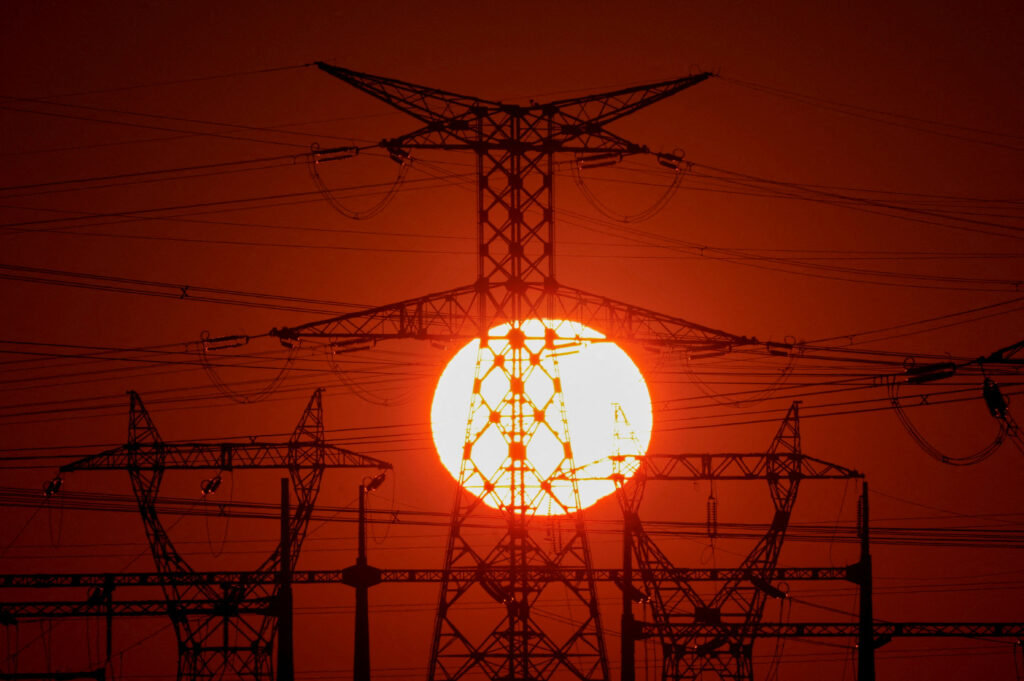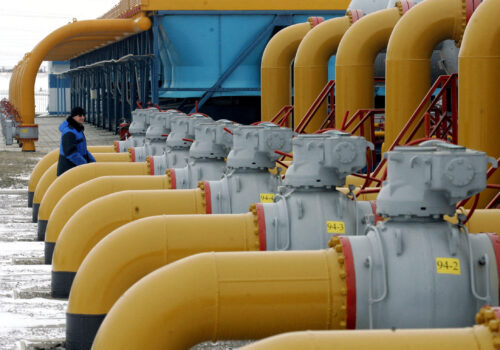MUNICH—At the Munich Security Conference (MSC) this past weekend, it was nearly impossible to find a session or speech that did not mention energy security. Russia’s full-scale invasion of Ukraine nearly three years ago triggered a major energy crisis on the continent. While the peak of the crisis, driven by Russian President Vladimir Putin, has subsided, Europe’s energy problems are far from resolved. In Munich, leaders and policymakers worried that the continuing energy crisis is weighing heavily on European defense capabilities, economic development, and geopolitical relations.
Unlike in 2022, when Russia manufactured an abrupt gas supply shortage, today’s energy threats are more gradual in nature. For example, undersea electricity and energy cables are being cut, and the suspected vessels are often part of Russia’s shadow fleet. Such attacks should still be taken seriously by the European Union (EU) and its partners both for the real damage they cause and because Russia could ramp up such attacks on short notice. In addition, kinetic and cyberattacks on the electricity grid, remaining gas supply issues and chokepoints, and high energy prices compound the danger.
However, it is possible for Europeans to address these threats to their energy security and mitigate potential damage to their societies and economies. It is reassuring, too, that the message that came out of Munich was one of unity and a desire to act. But now that leaders and policymakers have decamped from the Bavarian capital and returned home, what will happen next? Will Europeans sleep through these issues or take action? What should Europe do, and should member states or the EU take the reins?
Brussels and beyond
Over the past several decades, EU funding has enabled a massive build-out of grid and pipeline infrastructure on the continent. Considering the cross-border nature, risk, and scale of these projects, EU engagement was vital. It was also vital during the 2022 energy crisis, during which the EU increased its work on energy security. Today, too, current threats would be partially curtailed by the EU building additional infrastructure. However, as the European energy system goes through unprecedented transformation—electrification, digitalization, market interconnection, artificial intelligence integration, and further supply diversification—Brussels should not act alone. A multi-pronged approach is required to create and secure the energy system of tomorrow.
One reason a multi-pronged approach is needed is because of because of budget constraints. The COVID-19 pandemic and Russia’s intentional energy blackmail scheme, which cost Europe one trillion dollars, has left the EU coffers and many national budgets in a tight spot. There is still no vision around a shared borrowing scheme. European countries and other allies are rightfully prioritizing borrowing money to provide Ukraine with a significant influx of military support. This is especially the case following recent remarks from US President Donald Trump and Vice President JD Vance that suggest the United States will decrease its support for Ukraine and, potentially, for Europe as a whole.
However, the lack of funding is not the only barrier. Another frequently mentioned concern at the MSC was the challenging regulatory environment in Europe, as some member states take a more stringent approach to interpreting EU regulations at the national level. This difficulty is further compounded by geopolitical uncertainty. Thousands of companies operating in Europe are impacted by the sweeping environmental and societal disclosure mandates from the Corporate Sustainability Reporting Directive, the Corporate Sustainability Due Diligence Directive, and methane regulations.
All aboard the omnibus
The new EU leadership should be commended for responding to these calls by focusing on the promising omnibus legislation and sending a strong message with its competitiveness compass—a roadmap for boosting European competitiveness. The European Commission is expected to unveil the omnibus, intended to streamline the EU’s sustainability reporting, in late February or March.
There is plenty of irony in reducing regulations by rolling out another regulation, but the omnibus a tangible, timely, and thoughtful solution. If done right, it could provide needed certainty for investors and developers. The EU could accomplish this by outlining the scope of the existing and incoming regulations and by reducing costs for non-value-added certification, measurements, and verifications. Most important, the EU should make it easier for the private sector to reach common-sense objectives in a reasonable timeline, with eyes on the end goals rather than on processes and paperwork. This could also help create a more coordinated regulatory environment across the EU member states.
By simplifying its rules, the EU could encourage member states to harmonize their implementation of the regulations. Differences in implementation can create confusion and additional expenses for companies looking to deploy projects across multiple EU countries.
Reducing regulatory burdens by getting rid of non-value-added bureaucratic steps could also invite more US private sector partnerships, while transatlantic geopolitical and trade tensions settle. The European Commission’s new leadership does not need to sacrifice its carbon emissions reduction and environmental integrity efforts to address incoming energy sector threats. The omnibus could be the first step—and an impactful one.
Olga Khakova is the deputy director for European energy security at the Atlantic Council’s Global Energy Center.
Further reading
Mon, Jan 6, 2025
The Russia-Ukraine energy divorce offers a chance for Europe to take control of its energy security
New Atlanticist By Olga Khakova
Ukraine’s closure of a pipeline that supplied Russian gas to Europe offers the European Union an opportunity to enhance its economic and energy security.
Thu, Feb 6, 2025
Ukraine can play a key role in Europe’s future energy architecture
UkraineAlert By
Russia’s invasion of Ukraine has highlighted the need for Europe to pursue greater energy flexibility and connectivity, writes Nataliya Katser-Buchkovska.
Mon, Dec 2, 2024
Extend and expand the Nord Stream sanctions now
EnergySource By Alan Riley
The US Senate is moving toward preserving sanctions on the Gazprom-owned Nord Stream 2 pipeline, which expire at the end of 2024. The Senate must press ahead and extend those sanctions to Nord Stream 1 as well. By doing so, the United States would strengthen Ukraine’s security and Europe’s energy independence. Sign up for PowerPlay, […]
Image: Sun sets behind electricity pylons of high-voltage electrical power lines, in Gavrelle, near Arras, France, January 11, 2024. REUTERS/Pascal Rossignol.



